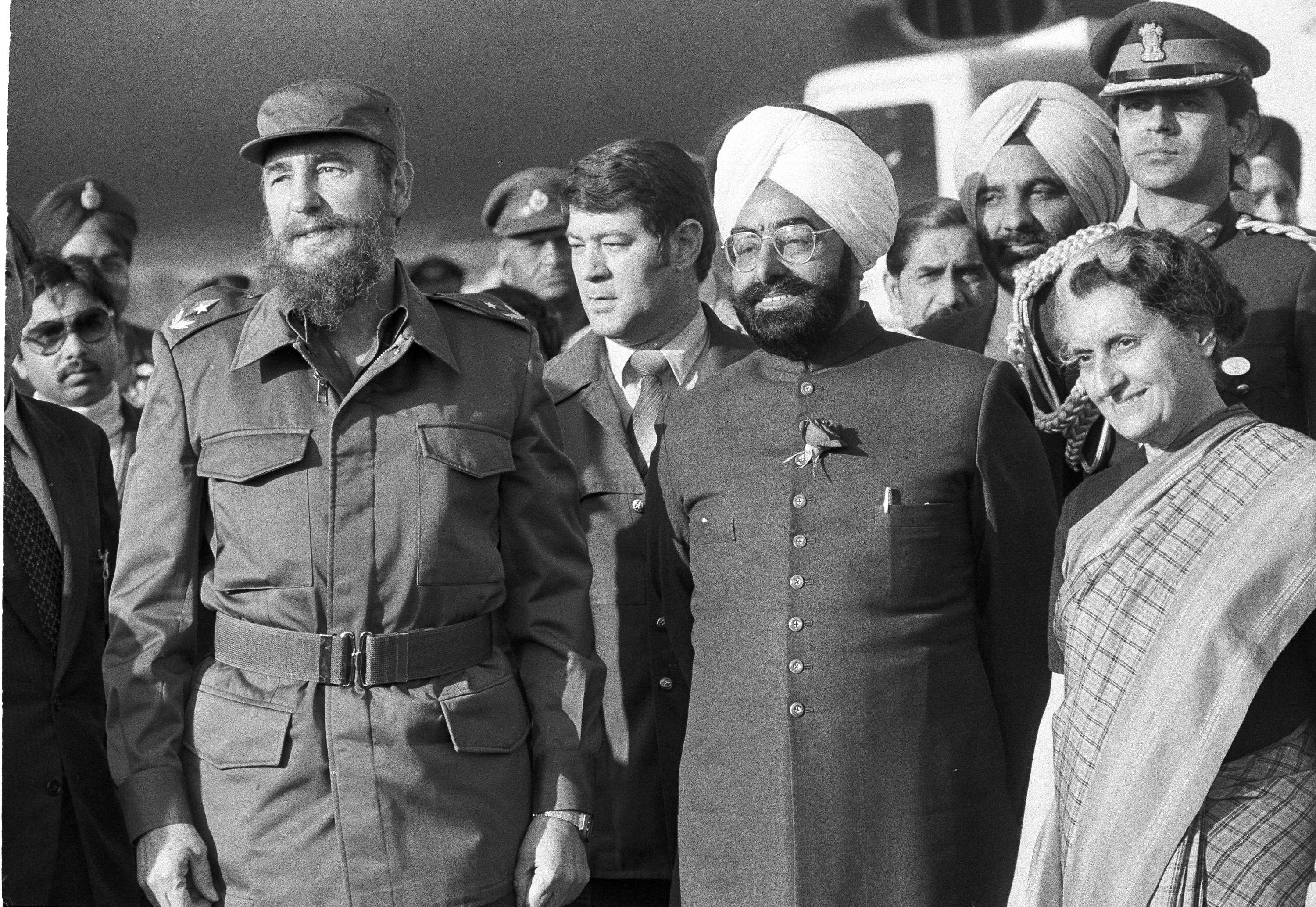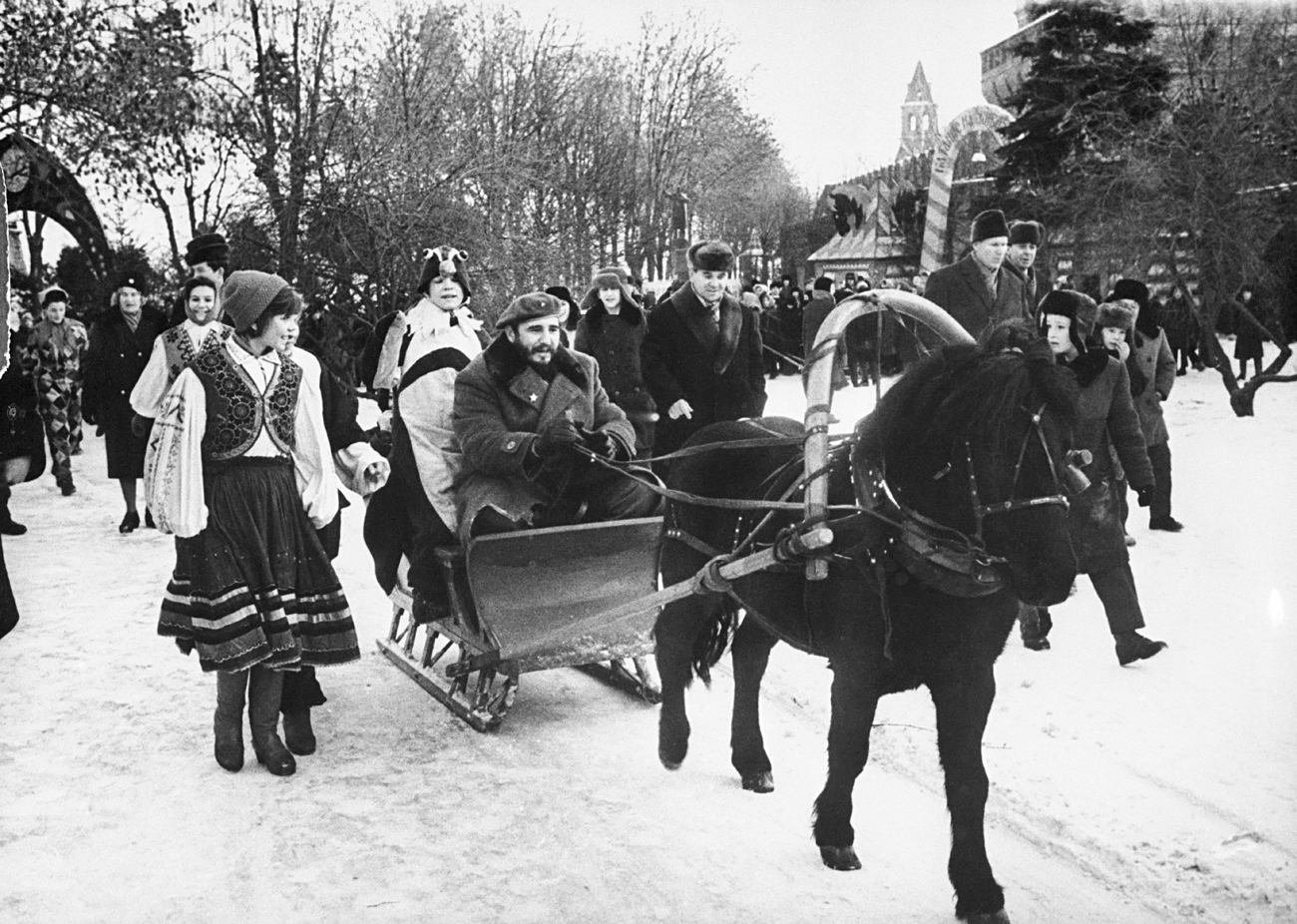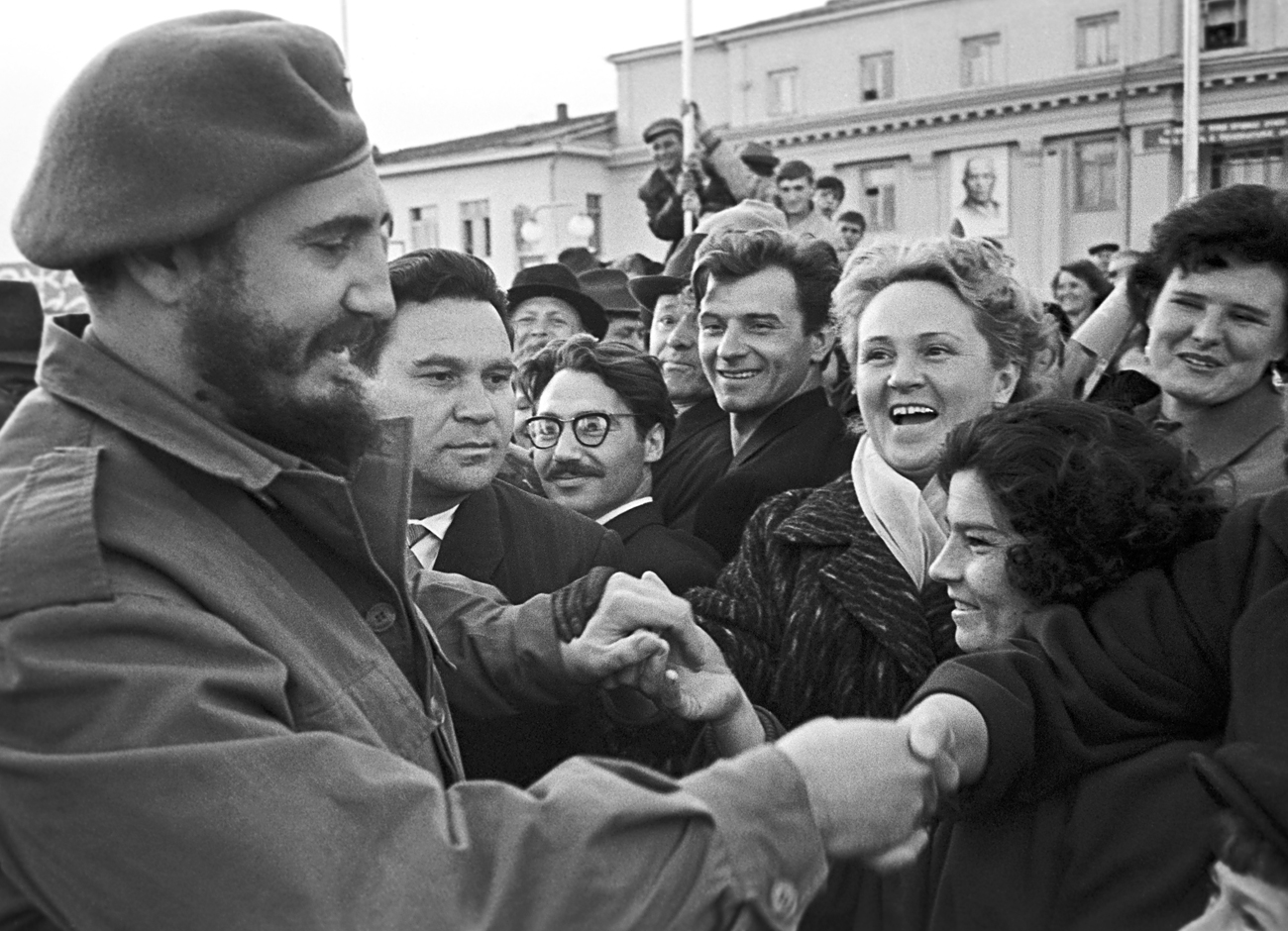
Cuban Prime Minister Fidel Castro, left, Indian President Zail Singh, and Indian Prime Minister Indira Gandhi pose for photographers after Castro arrived in New Delhi, March 6, 1983.
APFidel Castro’s death has revealed the dark underbelly of hatred that lurks in the West towards people whose ways are different from theirs. Westerners – who like to claim they are more civilised than the rest – are collectively celebrating the death of the late Cuban strongman. Their frustration is understandable as Castro was a thorn in their side, defying the West’s numerous attempts to assassinate him during the Cold War decades.
Russians and Indians who were huge supporters of El Comandante during the Cold War are showing contrasting emotions over his passing. While Russia is overwhelmingly positive about Castro’s legacy, and the majority of Indians and the traditional media reminisced fondly about the towering leader, a section of Indians on social media has attacked the late leader. This is curious because India had extremely friendly relations with Cuba. In contrast to thuggish western leaders such as Richard Nixon and Margaret Thatcher, the charismatic Castro was a popular figure among all classes of Indians as he represented the struggle of small countries against colonialism.
Those attacking Castro are regurgitating the same allegations the western media has been dishing out for years. They are convinced he was a “ruthless dictator” who incarcerated “thousands”. They go with the western narrative that Castro ran a police state where the citizens lacked freedom of speech. They blame Castro for Cuba’s economic problems.
Indians who are tweeting and posting anti-Castro views probably don’t know that Cuba’s per capital national income is $18,000 (PPP) compared with India’s $5000. Despite the blockade, Cubans have access to better healthcare than the US. Its life expectancy of 78 years compares well with America’s 79. The World Health Organization says the country’s health care system is an example for all countries of the world to follow.
 Children run alongside Cuban Premier Fidel Castro as he tries one horse open sleigh in Kremlin. Source: Getty Images
Children run alongside Cuban Premier Fidel Castro as he tries one horse open sleigh in Kremlin. Source: Getty Images
According to Denise Baden of the University of Southampton Business School, it is wrong to say that Castro ruled with an iron hand.
During her travels, she discovered that Cubans could speak freely and even criticise Castro openly, without being arrested or shot. Baden, who spent many years in Cuba, says: “While the older generation tends to view him as a hero, others describe him as a father figure. Many say they would not even be here were it not for the health advances.”
While many Indians know outfits like CNN, BBC and NYT are highly biased and lie blatantly – as was evident during the recent US elections – some accept their offerings at face value. Since the western media has dominated the news delivery system for decades, many are conditioned to start their day by following to these essentially propaganda outlets. So anything published about Castro is internalised without cross checking or getting the alternate view. (This is changing now with the increasing popularity of Russia’s RT and Iran’s Press TV and so on.)
Indians must understand there is no such thing as right or wrong, friend or foe. They take the concept of “World is One Family” too far, not looking at the context in which such ancient concepts were spelled out. They forget that Castro was an enemy of the US, which was an enemy of India during the Cold War. President Richard Nixon and his Secretary of State Henry Kissinger seriously considered nuclear bombing India in the 1971 War.
Indians ignore the 2,400 year old Chanakyan doctrine, which says your enemy's enemy is your friend. During WW II, Subhash Chandra Bose of the rebel Indian National Army sought the help of the Germans to fight the British. Although no contemporary Indian leader approved of Germany’s actions, all of them celebrated the reverses suffered by Britain against the German Army. If Bose is not tainted by his wartime connections, then Castro should not be treated like a pariah for being a communist. Indians should look at the world through the geopolitical lens – and work with anyone who works for their country’s interests.
Again, pretending to be outraged by Castro’s alleged human rights abuses is laughable when you compare it with America’s record. The US executes more people annually than any other country, with the possible exception of China which does not reveal its figures. Also, because of its invasions of Iraq and Libya, the US is responsible for the deaths of hundreds of thousands of people in the Middle East as well as the displacement of millions. When CNN and NYT accuse Castro – or for that matter any foreign ruler – of human rights abuses it is classic hypocrisy.
As for the tears being shed for "ordinary Cubans", it is again laughable. It is very likely these people couldn’t locate Cuba on the map. They have forgotten that the US had an illegal 50 year economic blockade of this tiny country. Any ship that docked in Havana was not allowed to enter US ports. It was pure and simple economic apartheid. Nobody will ever know how many thousands of Cuban children, the elderly and sick died because of shortages of food and medicine during the long decades of blockade. Meanwhile, the US has no qualms trading with China and its Saudi Arabian ally.
The argument that Cubans are attempting to escape or migrate to the US because Castro must be evil is lame. People normally migrate to a wealthier country and Cubans are no exception to this rule. Plus, many Cubans are desperate to reach the US before the repeal of the Cuban Adjustment Act which says that anyone who fled Cuba and entered the US would be allowed to pursue residency a year and a day later. If such a law existed for India, Punjab would soon be emptied of its population.
For the Russians, Castro remains a heroic figure who remained true to his ideal till the very end. According to Andrei Fomin, editor of the Moscow-based Oriental Review, “In the standoff of the Cold War it was impossible to underestimate the significance of the Cuban Revolution for Moscow. As a young, vivid, brilliant orator, who bravely challenged the empire in its backyard, he instantly became an outstanding gift to project Moscow’s influence in the region and worldwide.”
Some might argue Castro was a useful propaganda tool, but for Russia he was a loyal ally. Fomin told RIR: “Although he was a sincere friend of the Soviet Union, he never compromised the core interests of the Cuban people. The history of the Cuban revolution in 1959-1991 is an excellent example of a committed and just leadership as well as public enthusiasm.”
Russia may have moved away from communism – an outdated theory developed by a German named Karl Marx while holed up in a cold, dank London library – but many Russians feel that crony capitalism in their country is a greater evil than communism. In contrast, Cuba’s elites did not mutate into “greedy cynical conglomerates”.
 Fidel Castro (L) surrounded by Irkutsk residents. Source: TASS
Fidel Castro (L) surrounded by Irkutsk residents. Source: TASS
Cuba’s prosperity was in large measure due to billions of dollars in Soviet aid, which was critical in view of the blockade and economic sanctions. However, after the dissolution of the Soviet Union in 1991, Cuba did not meekly surrender to American bullying. “What followed proved that the source and strength of the Cuban Revolution lay deep within the Cuban people and its leaders,” Fomin says. “Lacking any foreign support for the last 25 years and subject to severe US economic sanctions, it did not surrender and did not choose Pepsi. For most Russians he was and will forever be a pillar of hope and genuine freedom. We wish we had our own Fidel, and I’m sure many other nations feel the same.”
During the 1970s, with Russian backing, the Cuban extended foreign military aid to a number of nations such as Algeria, Ethiopia, Guinea-Bissau, Congo, Cameroon, Mozambique, Zimbabwe, Sierra Leone, Yemen, Vietnam, Cambodia and Laos. On many occasions the Cuban military fought vicious battles against western proxies and often came out on top, most spectacularly in 1977 when a Cuban-Ethiopian pincer supported by a massive Russian airlift of tanks and artillery defeated US-backed Somalia.
However, it was in Angola that the Cuban military machine tasted its most celebrated victory, crushing the occupying South Africa Defence Forces, and contributing to the quick collapse of apartheid.
Cuba first sent troops in November 1975 following a request from Angolan President Agostinho Neto who feared a South African invasion. The South Africans, who were supporting the murderous Jonas Savimbi and his Unita rebel force, found plenty of backers in the West, especially the US, UK and France. Alarmed by the growing involvement of the Americans and Europeans in the war, Cuba poured more than 65,000 troops into Angola.
With Castro moving his offices to Angola, the Cubans dealt a crushing defeat to the racist regime. More than anything else, it is this crushing defeat that the West can’t handle. Since the US and the UK took this as a personal defeat, the wound is deep. And that is why the media of these two countries is the most strident and vocal in painting Castro as evil. They lost fair and square and now that he is no more, the West wants to tar his legacy.
But these are mere inconvenient facts for those criticising Castro. If you still want to join the Americans in celebrating his death, go ahead. They don't know – or care – you exist.
All rights reserved by Rossiyskaya Gazeta.
Subscribe
to our newsletter!
Get the week's best stories straight to your inbox